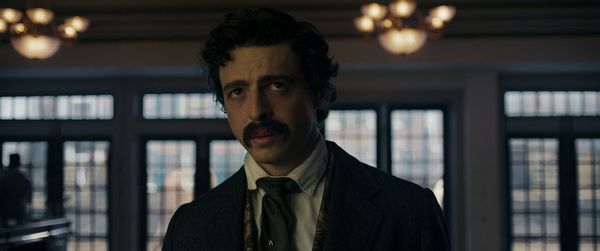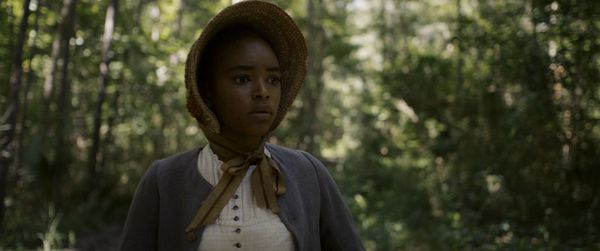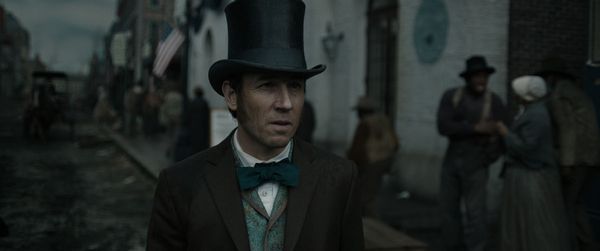
Much like one of its secondary characters, "Manhunt" is a peculiar kind of double agent. Initially, it progresses as advertised: a conspiracy thriller that launches with one of American history’s most famous crimes. The assassination of Abraham Lincoln (Hamish Linklater) at Ford's Theatre is, like his biography, a tale often told.
Most of these works depict Lincoln's assassin John Wilkes Booth (Anthony Boyle), as a bit player in a great man’s story, with an exception being Stephen Sondheim’s "Assassins."
This adaptation of James L. Swanson's bestseller, "Manhunt: The 12-Day Chase for Lincoln's Killer," fleshes out Booth's role only so far as it's required to show him as he is: a petty, second-rate thespian with delusions of grandeur who leaps from Lincoln’s balcony box onto the stage after he shoots him in the head.
Showrunner Monica Beletsky, a "Fargo" veteran, makes Booth less than that, a servant to the schemes of greedy men with vision and wealth who are convinced they can restore slavery in the South.
Through them, Beletsky and her writers enact a secondary history lesson personified through Lincoln’s confidant and Secretary of War Edwin Stanton (Tobias Menzies).
I haven't read Swanson's book, but Stanton's role in this version of history seems extremely embellished. He's part Eliot Ness, part devotee to a dead good king. He's also asthmatic, which is true, and to a degree that prevents him from moving fast enough to intercept Booth as his officers close in.

This is where references to the 40 acres promised to newly freed Black Americans originate: a discussion between Stanton and Union General William T. Sherman that yielded Special Field Order No. 15. Though the show doesn't mention the order by name, it presents it as a concrete, if fleeting, victory worth protecting by bringing us into the story of one of its beneficiaries, Mary Simms (a subtle performance by Lovie Simone).
Simms, an enslaved woman serving as a domestic for the doctor (Matt Walsh) who treated Booth's broken leg, is a witness to her oppressor's crime doubly robbed when she takes possession of the land promised to her, only to have it taken back from her.

Stanton does try, mainly by trying to be everywhere all at once. One minute, he's dining with a wealthy relative who's secretly contributing to Lost Cause hangers-on. The next, he's uncovering cargo that holds the key to exposing the defeated Confederacy's spy network.
All the while, Booth, who breaks his leg in the leap from the scene of the crime in Lincoln's theatre box to the stage, is steadily reduced from a Confederate hero to a sweaty, screaming condemned man limping around in dead soldiers’ clothing. Shortly before he's caught, he brags about who he murdered to a gaggle of shattered veterans too exhausted and demoralized to care.
Had Beletsky and the writers relied solely on the titular history and its performances, "Manhunt" wouldn't have held me beyond its first couple of episodes. But its noble, if slight, effort to explain what this turn meant for generations of Black Americans grants the series a higher purpose that, combined with Menzies' stoic and heartfelt performance, kept me engaged.
Mind you, Menzies' energy elevates the material. Stanton, as written, is a typical hero, down to the wife who begs him to abandon this dangerous and all-consuming mission, think of his health and so on. With all that, he still sculpts a performance that is solid granite supporting a crackled shale of a script.
Try as he may, he can't fully mask some of the didactic "we're going to teach you something" nature of the dialogue, even if what it's conveying is historical information that most people don't know. Reconstruction is glossed over history at best, and its ramifications linger nearly 160 years after Lincoln's murder.

"You will see thousands in misery on the streets. Is that the America you want?" Stanton lectures Johnson to prevent him from rescinding the promised land grants, adding: "You are making a mistake that may take decades to mend. Please, I am begging you: Keep the order."
Alas, there are too many villains for Stanton to take alone, many of them designed to echo versions of men we’re living with now. Decent historical dramatizations should make us reflect on this design. The irksome part of "Manhunt" is the way the writers seem to assume the audience isn't savvy enough to notice the many modern parallels, so they shove air horn blasts into the dialogue to make sure we don't miss anything.
Some are goofily anachronistic, as when Johnson mutters a few times about pulling himself up by his bootstraps like everyone else. Others, such as when Stanton declares, "This is America, we replace our presidents with elections, not with coups," or "I think if we don’t draw the line with traitors, there is no line," might as well have coincided with someone behind him pointing to Jan. 6 on a calendar while clearing their throat.
In case we still don't pick up all that subtext, one mustache twirler holding a gun on Stanton hisses, "I could fire this on Wall Street in broad daylight, and nothing would happen to me."
Chances are you already know how Booth's story resolves, leaving it to Boyle to make him both compelling and hateful enough to cheer for his ignominious demise. True to his duty, the actor squeezes Booth's depravity just enough to slick his portrayal with a thin slime of odiousness — enough to make him nasty, yet bearable enough to keep us invested in seeing if and when he gets what's coming to him.
He may be one of the lesser established stars in a cast that includes Lili Taylor and Patton Oswalt as spymaster Lafayette Baker, the detective to Stanton’s administrator, but his pull balances Menzies'.
Some people may also recall that Harrison Ford was supposed to star in a movie adaptation of "Manhunt" that withered on the vine years ago, not as Stanton, but as Col. Everton Conger, the man who eventually trapped Booth at the end of these 12 days. We may yet see that version, and it wouldn’t take much to improve upon this one. However, it may not contain as much ambition and eagerness, overly-applied though it may be in this TV show, to entertain us into getting its many points across.
The first two episodes of "Manhunt" are streaming on AppleTV+, with new episodes debuting Fridays.







